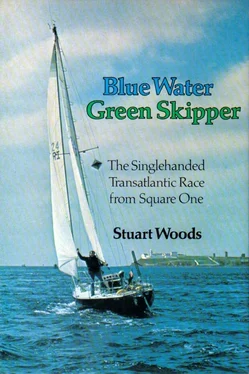I caught a cold. Coming down the Channel, my throat had become sore and now the whole thing blossomed. This, combined with some queasiness from the rough seas we had begun to experience, made my first week out very uncomfortable. I had little energy and what I had went quickly when I had to deal with some problem, like when the Big Jenny wrapped herself around the forestay. It was worse than the spinnaker wrap had been on the Azores trip, and took a lot longer to get undone.
I was still in radio contact with Land’s End and St. Mary’s Coast Guard at the freakish distance of 110 miles out, although I could read them better than they me. I tried to relay a message from Lizard Coast Guard to FT about this time, but couldn’t raise him. This reinforced my belief that he had gone farther north than I.
My radar detector seemed to work, waking me in the middle of the night once, when a big merchant ship went by. Trouble was, it detected other things, too, like my electric razor, and often came on when the boat was being tossed about. Still, it seemed better than not having the thing at all.
I learned the hard way that no sail could be lashed on deck on the leeward side in any kind of a sea, or even on the windward side when things were rough, without its going overboard. This happened twice, but since the sails were shackled onto the deck at the tack, they were recoverable. It was not nearly so tough to get them back on board in a Force seven as it had been in the Force ten coming back from Horta, but it wasn’t a hell of a lot of fun, either, and with the cold sapping my strength, it was exhausting.
We were constantly in fresh winds, usually Force five to seven, and sometimes sailing free, so our daily averages were usually a hundred miles or better at this point in the Race, and I felt good about the possibility of achieving my twenty-nine-day goal.
My only brush with the opposite sex at sea, a few dolphins apart, came when I raised the German merchant ship St. Clemens on the VHF and found, to my delight, that she had a female radio operator, one Heidi Riedel. Heidi and I chatted for ten to fifteen minutes, both regretting that we could not get together for a drink. She was from Hamburg and promised to take a message to an old friend there for me. It was the last leisurely radio conversation I would have with anybody, because soon after that when I switched on the ignition to charge the batteries, the engine would not start. The trouble was clearly electrical, and among all the things I did not do well, electrics ranked high. I removed the switch panel, checked all the wiring, and sprayed everything with some stuff which was supposed to dispel moisture and improve electrical connections, but nothing. I checked all the connections on the starter motor and sprayed those. Still nothing. I tried jumping the electrics with a screwdriver blade but succeeded only in making a lot of sparks and frightening myself. Finally, all my electrical ideas exhausted, I tried starting the engine with the hand crank. The manual said this was easy to do, even in cold weather. Ho, ho. I cranked the bloody thing until I couldn’t stand up anymore, a marline spike stuck under an alternator belt to control the decompression lever. I’d get it spinning well enough, but as soon as I released the decompression lever the engine would stop turning. I thought perhaps a stronger man might turn it further, but I doubted it.
This was a depressing situation, because it meant that when the charge remaining in the batteries was exhausted there would be no electrical power left on the yacht. This would mean no VHF, no cabin lights, no instruments, no stereo tape, and, worst of all, no navigation lights. I would still have radio reception for weather reports, radio direction finding and entertainment on the battery-operated Brookes & Gatehouse and Zenith radios, and depth sounding on the battery-operated Seafarer but no log for speed and mileage recording, no wind direction or wind speed, and no off-course computing from the Hadrian.
I had gone to such pains to ensure that I had the best possible battery charging system, extra-large batteries, two alternators, etc., and now here I was without electrical power because I could not start the engine, a possibility that had never occurred to me. A thousand pounds’ worth of electrical and electronic equipment was now useless. I went over the whole system again, afraid that I would arrive in Newport, somebody would point at a loose wire and say, “That’s your problem.” There was nothing loose, and apart from that I didn’t know where to begin. I stopped using everything electrical except the log.
There had been a shortage of sun for the last few days, and I had been proceeding without sun sights to fix my position. Now, as the remaining charge in my batteries faded away, I knew I would soon be without the log, valuable for keeping a good dead reckoning position. Finally, the log ground out its last hundredth of a mile and stopped. I was left with only those navigational aids which mariners had used for centuries: the compass and the sextant.
I had been at sea for eight days when I got the first bad news. Dominique Berthier, one of the two French girls competing, had lost her yacht, 5100, but had been rescued by a French trawler. I wondered how she could have been near a trawler after eight days at sea, far from the continental shelf. (Later information: Mlle. Berthier had collided with an unknown cargo carrier and received damage to the yacht’s hull. The boat started to take a lot of water and she decided to return to Brest. Nearing France, just off Seil Island, the hull began to break up and she abandoned the yacht for the life raft, watching the boat sink twenty minutes later. Shortly after that she was taken aboard by the trawler and was in Dovarnenez by midnight.)
I had finally found the radio frequency for the special weather forecast being broadcast for us by the BBC World Service and what I was hearing sounded very bad for the yachts on the more northern routes. Confirming this, I heard the wife of Guy Hornett, who was sailing Old Moore’s Almanac, on the Jimmy Young show on Radio 2; she said Guy had run into two successive Force nine severe gales. Later in the day the BBC reported that Pierre Fehlmann on Gauloise had begun taking water and had retired, and that Yvon Fauconnier on ITT Oceanic (formerly Vendredi Treize ) had broken an arm and that some of his sails were in the water. Jock Brazier, in Flying Angel, was also reported to have retired with self-steering problems, and H. G. Mitchell in Tuloa was said to have retired. That made five that I knew about. What else was happening up there? (Later information: Pierre Fehlmann lost Gauloise, and was taken off by another ship under very trying circumstances; Fauconnier and ITT Oceanic were taken in tow by a Russian tug; Guy Hornett and Harry Mitchell finished the race.)
For three days I was in very thick fog with light headwinds, a very bad combination. I could see nothing, and nothing could see me, but at least there was the consolation that merchant ships would be using their radar, and I had a large radar reflector mounted fifteen feet up on the backstay. In fact, it might be easier to detect my presence that way than by eye, especially at night. My daily average began to drop as I tacked through the soup in the light winds. I did some figuring that at my present rate it would take me forty-three days to finish. That was a horrible thought, but I felt it couldn’t go on forever like that, and that we would get reaching winds after the Azores and the turn west. After freshening and freeing us for a few hours, the wind went light again and back on the nose. To make matters worse, there was a very large swell running, the product, I suppose, of the rougher weather farther north. This made it very difficult to take advantage of what little wind there was. I had set the drifter, the superlight nylon genoa, but the violent motion of the boat shook the light breeze from the sails and the boom swung back and forth and had to be tied. It is one thing to sit on a flat sea with no wind. It is quite another to roll about with no wind. Cooking became messy; messier, even, than in rough weather, when there is a kind of rhythm to the seas. I spilled a glass of red wine all over the tennis whites I was wearing and into my bunk. I got even more bruised than I did in heavy weather, especially around the knees and thighs, from bumping into things.
Читать дальше












